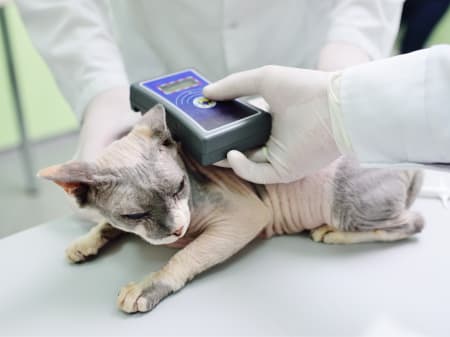What is a microchip?
A microchip is a tiny chip that uses radio frequency identification (RFID) to help vets and animals shelters locate the owners of lost cats.
Microchips are about the size of a grain of rice, they are inserted under the skin between your cat's shoulders with a needle. This procedure does not require your cat to be put under anesthesia and typically involves little discomfort for your cat. Most cats have almost no reaction to having their microchip implanted!
After your cat has been microchipped, the chip's serial number and your information are registered in a database. Vet's and shelters can search this database and find you if they scan your cat's chip.

Why not just get a collar and tag for my cat?
When it comes to returning lost cats to their owners, collars and tags are useful tools. People can simply read the tag, and call the phone number listed on it to contact the owner. Outdoor cats should always have collars and identification tags in case they get into trouble. Be sure to include your name and contact number on your cat's tag. Identification tags are equally good for indoor cats since there is always the risk they will sneak out when owners aren't looking. As good as it is to equip your cat with a collar and identification tag, tags can fall off and get lost, leaving your cat with no identifying information. Cat microchips are a permanent way to provide your kitty with a means of identification.
Note: It is important to keep your microchip registration information up to date. Be sure to contact the microchip company to update your information if you move or change your contact number.
How do microchips work?
If your cat has been found, the vet or rescue organization will use a special scanner to read the microchip. Microchip scanners are universal and can read all modern chips, regardless of their brand. When the scanner is passed over the cat's back and sides, the microchip will transmit its unique identification number to the scanner. The rescuer will then contact the national database to find out your phone number so that you can be notified that your cat has been found. Should your cat be stolen, microchips can also be very helpful when it comes to proving ownership.
